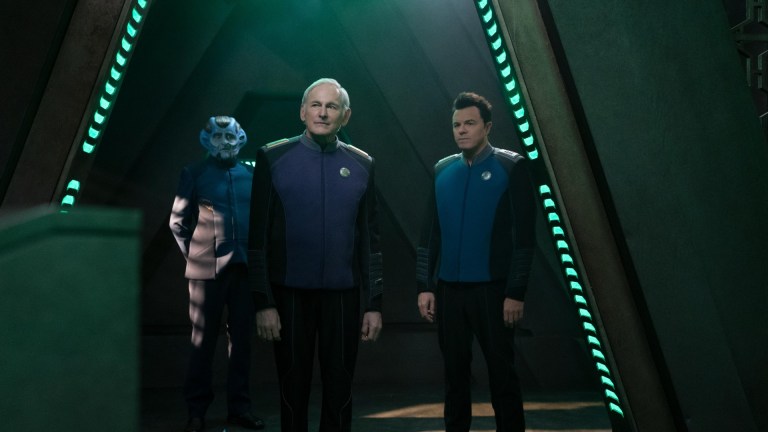The Orville: New Horizons Season 3 Episode 4 Review – Gently Falling Rain
New Horizons continues to pave a path for the Orville universe by having yet another loaded episode that teases many future payoffs.

This review of The Orville: New Horizons contains spoilers.
The Orville: New Horizons Season 3 Episode 4
Good science-fiction should challenge us. It should contain subtext that can teach, subvert, and even make us uncomfortable by shining a light on aspects of our world we don’t want to look at. Whether it is the golden standard of this layered writing style such as The Outer Limits, the legendary The Twilight Zone, or recent forays into the genre like Black Mirror, these tiny vignettes of fiction are loaded with political subtext and important morals. This week’s “Gently Falling Rain”, much like the season 3 premiere of The Orville: New Horizons perhaps goes from subtextual to “textual”, but can definitely be considered one of the biggest episodes of the series in terms of scope, impact, and timeliness.
Jon Cassar, director of “Gently Falling Rain”, chooses to open the story in a very ominous and almost silent fashion, giving audiences a stoic shot of the Krill home world. As we cut to the planet’s surface, Teleya (Michaela McManus), long time thorn in the side of Captain Mercer (Seth MacFarlane), preaches that the current Krill Supreme Chancellor, Koran, is a false prophet. She stands vehemently against a treaty with the Planetary Union spouting the rhetoric “Krill comes first” in a Trumpian speech that rouses a large and angry crowd.
The political message of “Gently Falling Rain” is clear from the first few minutes of the episode. Writers Brannon Braga and André Bormanis create fairly obvious parallels to the recent surge of populist movements, as well as militaristic coups, using fear to tap into the ignorance of the voting public, and the use of misinformation against one’s political opponent. Throughout the episode, it is Teleya’s evil regime acting as the parallel for real life reprehensible far-right tactics.
The central conflict comes when Koran begins to lose the election, something he thought was a sure thing, no doubt furthering the parallel to a recent American presidential vote. What’s worse is the results of the Krill election have far reaching implications in the Orville-universe. If Teleya wins, it isn’t simply bad news for the Krill, but without our hero’s Supreme ally in a position of power, the treaty between the Union and the Krill is as good as dead. This proposed treaty has been a major Orville revelation since late in season 2, and would change the dynamic of the entire galaxy.
As mentioned, the intention behind this episode is certainly admirable. The lesson behind recent events in elections all over the world, and the terrifying prospect of losing the democracies that many sovereign nations have worked towards deserves our attention. Yet, some of the major beats which are clearly meant to convey this subtext certainly lack subtlety. One particular scene, after Mercer is informed by Admiral Halsey (Victor Garber) as to Teleya’s rise in populist power is extremely ham-fisted.
As Mercer and Commander Grayson (Adrianne Palicki) discuss the absolute debacle which is the Krill political system, they seemingly speak only in t-shirt worthy idioms. Phrases such as “rhetoric and fire” or “emotions can be more persuasive than thoughts” may ring true, but they ring loudly. A little too loudly. They seem more worthy of your Aunt’s Facebook banner rather than an otherwise well-crafted episode.
The latter half of the episode is almost perfectly balanced and oftentimes, quite exciting. Even as the Union delegation approached the surface of Krill (before the coup started), the scope of the episode is evident and epic. The musical score swells to John Williamsian proportions, while the Krill homeworld itself, has a strange dark beauty to it, reminiscent of Blade Runner. Seeing the capital city of Dalakos was an amazing way to build The Orville universe, and gave the episode a larger cinematic sense than television can often offer.
The major events of the episode expanded the universe in shattering ways as well. After Chancellor Koran was publicly executed only moments after allegedly losing the election, it appeared the same fate was to befall the Union delegation. Before that, however, Mercer and Teleya had a heart-to-cold-Krill-heart, discussing their complicated love-hate relationship. There were some niceties, but ultimately the audience had to know they would never see eye-to-eye. With Teleya’s heart still filled with so much anger because of past events, the treaty would never be signed, which leaves the delegation and the Orville in orbit, in real danger.
Suddenly and mysteriously, Mercer is led out of imprisonment by two guards with no explanation. When they slink through the streets of Dalakos like the Krill version of rats, inexplicably again, Mercer is just as suddenly taken by a small faction of armed Krill. The guards that led him out are killed in the street, and he is taken to a small underground building. While there, a small faction that opposes Teleya reveals to Mercer that he and Teleya have a daughter; an adorable half human-half Krill named Anaya. Teleya has provided for the girl, but never visits, fearing the child will taint her image in the eyes of her rabid supporters.
If one scene where MacFarlane and McManus wasn’t enough, the second scene after Mercer purposefully goes back to be imprisoned again is absolutely brilliant (despite perhaps the logic of him going back to be re-imprisoned in the first place). The hidden emotions that both actors convey in the scene where Mercer confronts his former lover about their child is truly captivating, and MacFarlane shows more dramatic chops in that one short scene than he’s shown previously in his career. Teleya even reveals that the name “Anaya” is the reason for the title of the episode, as it means “Gently Falling Rain”. The writers should be extremely proud of this scene (as should MacFarlane and McManus) as it shows the layered subtlety they are all capable of, with both Teleya and Mercer showing a great emotional range.
Yet sadly, once again, the forceful “textual” subtext of the episode quashes any emotional momentum this heated and passionate exchange builds up for the episode. As a slapdash conclusion to Mercer and Teleya’s argument, the writers added a parable about abortion, which is certainly a loaded and touchy subject to say the least.
Mercer poses the question to Teleya that if Anaya is such a burden, why did she have her in the first place? Teleya takes Mercer to a nondescript Krill clinic where she shows him what the Krill do to those who choose to terminate a life. In a barbaric practice, the Krill take the DNA samples from the parents and create a simulation of exactly what the lost child would look like later in life. It is meant to be barbaric and hard to watch, as the audience is clearly not meant to sympathize with the Krill’s pro-life philosophy.
While this review won’t dare touch the politics behind that subject, this particular moment in the episode is beyond forced. The argument between the former lovers could have easily ended with Mercer simply posing his pointed question about why Teleya went through with it, but this particular political debate seemed to be a tidbit that Braga and Bormanis simply had to add. In a loaded episode, adding this one throwaway clinic scene added very little other than a shoehorned, secondary preachment.
What has been enjoyable about this season so far is that many of the episodes have set up storylines that will undoubtedly come to haunt the crew of the Orville. This episode, while thinking about the future and setting up darker story paths, also contains several heartfelt moments. Mercer having a daughter is a great story thread. Talla (Jessica Szohr) was promoted to Lieutenant-Commander, and while celebrating with her fellow senior officers, she and LaMarr (J. Lee) had an unexpected flirtatious moment, and it will be interesting to see how this could evolve in the future.
This was, for the most part, a superbly well-acted episode with a well-balanced story; a story which has reshaped the fabric of the show and its main characters. While the writers could have found an iota of better balance, it’s exciting to think of them playing the “long game” when it comes to the journey of the show.
